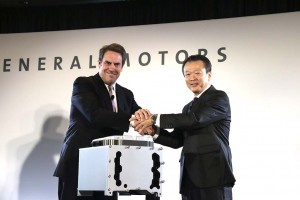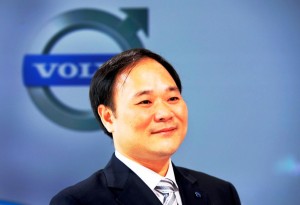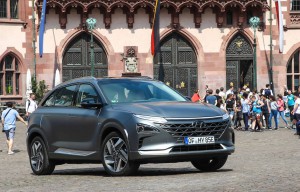The automotive industry is increasingly becoming reliant on partnerships, the latest being the tie-up between Hyundai Motor Group and Audi AG.
Like so many other companies before them, the South Korean and German automakers are looking to find a way to get to the promised land of alternative fuel vehicles. In this case, the makers are partnering on the development of fuel cell electric vehicles.
Unsurprisingly, whatever patents, technologies and revolutionary breakthroughs resulting from this new coalescence will trickle down, well, more like over to Kia Motors Co. and Volkswagen AG. Kia is Hyundai’s sibling and VW is Audi’s parent companies. These advances can also be shared among other affiliates within either group.
“The fuel cell is the most systematic form of electric driving and thus a potent asset in our technology portfolio for the emission-free premium mobility of the future,” said Peter Mertens, Board Member for Technical Development at Audi AG.
(Hyundai, Kia announced global reorganization plans. Click Here for the story.)

GM Global Product Development Director Mark Reuss and Honda North America CEO Toshiaki Nikishiba can celebrate once again as GM and Honda are partnering on battery technology.
“On our FCEV roadmap, we are joining forces with strong partners such as Hyundai. For the breakthrough of this sustainable technology, cooperation is the smart way to leading innovations with attractive cost structures.”
The road to no-emission success is marked by plenty of toll booths and sharing that expense makes sense. Automakers like General Motors and Honda, which are paring up to develop next-gen battery technologies as well as a fuel cell that is expected to be ready in 2020.
Additionally, Ford and VW’s new deal covers a wide range of programs, including commercial vehicle development. BMW and Toyota also work together. This doesn’t account for the non-automakers partnered with car companies.
The reason for partnering these days is pretty simple: efficiency.
“Ford is committed to improving our fitness as a business and leveraging adaptive business models – which include working with partners to improve our effectiveness and efficiency,” said Jim Farley, Ford’s president of Global Markets.
(Click Here for more about the GM, Honda partnership.)
Part of efficiency is the reduction in costs. The industry is already rife with shared components, developing technologies that will eventually be streamlined at a lower cost is an avenue that cannot be ignored. More importantly, there are likely to be more deals coming, starting with a partnership between Daimler AG and Geely Motors.

Geely Chairman Li Shufu purchased 9.7% of Daimler AG for $9.2 billion, and expects to partner with them on electrification.
Li Shufu, Geely’s owner, told a German newspaper earlier this year that partnerships were critical to the industry’s growth and each automaker’s survival. Li said that traditional carmakers could only survive far-reaching structural change in the automotive industry through enhanced cooperation.
“We must actively assess the possibility of comprehensive alliances, instead of hiding from reality by sticking our heads in the sand,” Li wrote. He added that “any legally-feasible bilateral and multilateral cooperation of mutual benefit” needed to be “discussed.”
The partnership between Hyundai and Audi will leverage collective R&D capabilities in fuel cell technology to elevate their presence in the FCEV market, the two companies claim. Therefore, the agreement also includes mutual access to fuel cell components.
Hyundai is giving Audi access to parts that are based on Hyundai’s know-how accumulated from the development of ix35 Fuel Cell as well as Nexo. Audi will also be able to take full advantage of Hyundai’s FCEV parts supply chain. Hyundai is the leader in the technology, offering it for its Tucson SUV since 2013, and currently sells them in 18 countries around the world.
(To see more about Geely’s Li Shufu’s beliefs about auto partnerships, Click Here.)
Elevating and accelerating are the keys to these partnerships. China, Norway, France, Germany, Great Britain and other countries have either set firm deadlines for the elimination of gas and diesel vehicles or are considering measures to do the same. The first of these is China’s move away from those internal combustion vehicles by 2040. Some cities, such as Paris and London, are considering bans much sooner.


